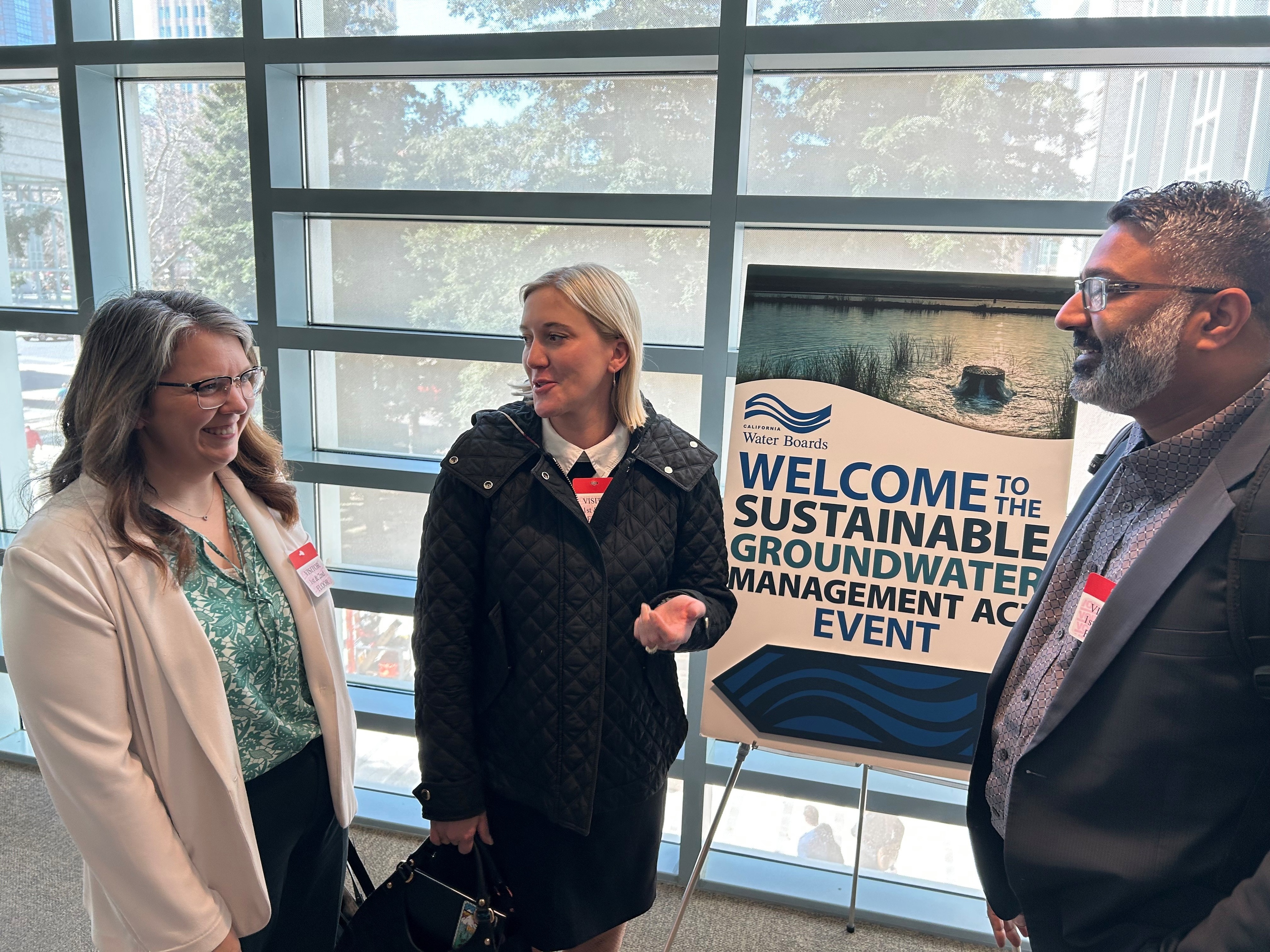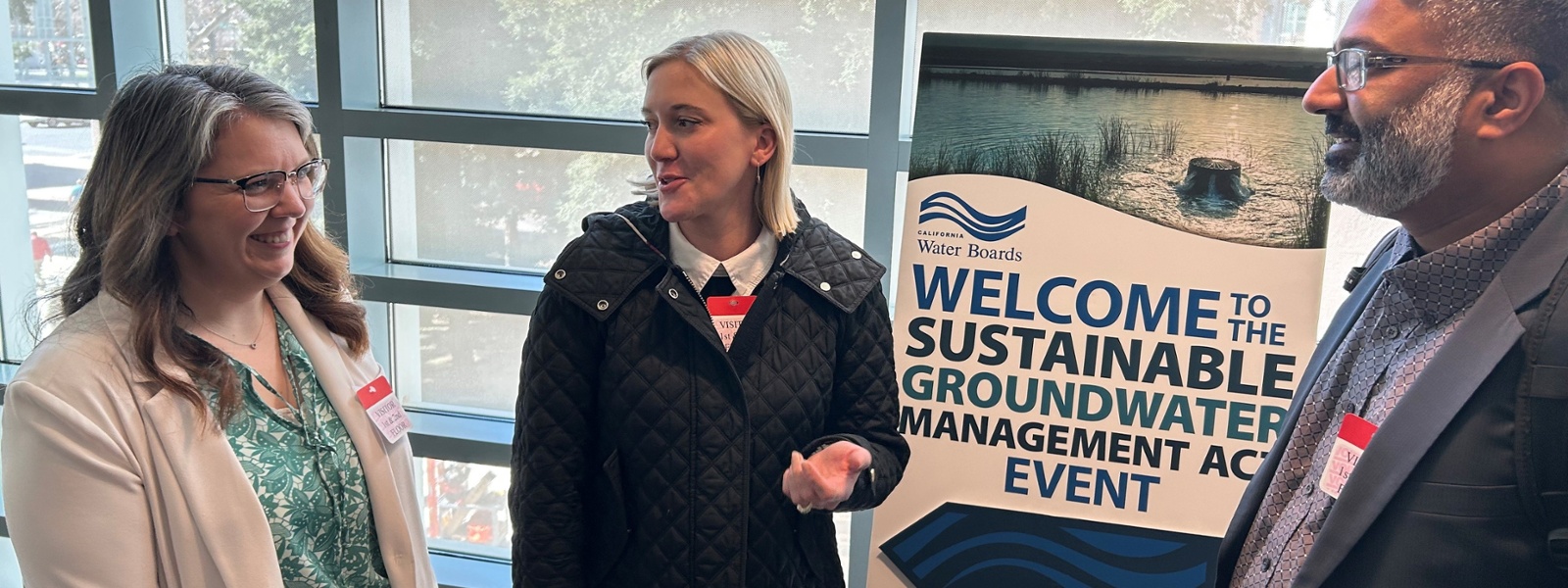State water board delays probation for Kern subbasin

Kern County farmer Jenny Holtermann, left, Alexandra Biering of the California Farm Bureau and Jeevan Muhar of the Arvin-Edison Water Storage District attended a hearing last week on the Kern County Subbasin by the California State Water Resources Control Board.
Photo/Christine Souza

By Christine Souza
Groundwater agencies in Kern County have been given more time to improve their groundwater sustainability plans and potentially avoid state intervention.
Citing significant progress in the agencies’ plans to bring the critically overdrafted Kern County Subbasin into sustainability by 2040 under the Sustainable Groundwater Management Act, or SGMA, the California State Water Resources Control Board last week continued its hearing to Sept. 17 on whether to place the subbasin in probationary status.
This marks the first time a probationary hearing has been continued. As part of the continuance, the board asked the Kern Subbasin’s 20 groundwater agencies to submit their collective revised plans by June 20, to provide time for the board to review updated plans before the hearing.
State water board Chair E. Joaquin Esquivel acknowledged that the Kern Subbasin is geologically complex and said there has been substantial progress by local agencies toward plans that ensure sustainable groundwater management.
“Continuation is not delay,” he said. “This additional time gives agencies the opportunity to quickly correct deficiencies and do so in closer collaboration with communities in the basin.
“The board appreciates the efforts of groundwater agencies and communities to engage constructively on approaches to remedy problems and protect groundwater resources,” Esquivel added.
Kern County Farm Bureau President Jenny Holtermann, who farms almonds in Wasco, said water districts and groundwater sustainability agencies, or GSAs, have committed to working collaboratively to address deficiencies identified by state water board staff.
“The agencies have turned in some updated groundwater sustainability plans, and there’s definitely some improvements,” said Holtermann, who also serves as executive director of the Kern Non-Districted Lands Authority and the Water Association of Kern County. “We’re very encouraged.”
On behalf of the Kern County Farm Bureau, Holtermann, in a letter to the state water board, said a probationary determination would trigger metering, reporting and payment of fees. This would divert time and money from local efforts, she said, adding that the intent of SGMA is for groundwater resources to be managed locally.
During the meeting, the board recognized the progress made by Kern subbasin groundwater agencies in revised plans adopted last December. The board specifically noted that the plans minimize land subsidence and mitigate dry wells. It also discussed ongoing deficiencies in the plans to address declining groundwater levels and water quality degradation.
Derek Yurosek, chair of the Kern Subbasin Coordination Committee, said the hearing “marks a significant milestone, a culmination of nearly two years of rigorous effort, collaboration and commitment from our GSA to establish a clear, actionable path forward for our local agencies to achieve long-term groundwater sustainability.”
The Kern County Subbasin, which is geographically the largest in the state and spans nearly 1.8 million acres, has a level of complexity that requires unprecedented coordination, he said.
“I’m proud to say that all 20 GSAs in the subbasin have worked together to balance their varied and localized needs and hydrology, to develop a fundamental and foundational unified vision for how the subbasin will achieve groundwater sustainability,” Yurosek said.
“Our active approach has been driven by technical rigor, a steadfast commitment to protecting beneficial use and users and continuous refinement based on feedback from impacted beneficial users,” he added.
Alexandra Biering, a California Farm Bureau policy advocacy director, said, “It’s really been incredible to see how so many of the basin’s GSAs, groundwater users and communities have made incredible progress in working with board staff and developing actions to address the deficiencies identified in the revised and amended GSPs.”
Biering talked more about the complexities in the subbasin in terms of water supply, which she said are from water imported from the State Water Project, the federal Central Valley Project and surface supplies. She said the subbasin has a large capacity for groundwater recharge, banking and storage.
Todd Snider, owner of a Bakersfield-based crop insurance agency and an investor in agriculture businesses in the Central Valley, said he is pleased that the board agreed to postpone the decision. He called for strengthening relationships with stakeholders while also keeping farmers farming.
“To become a farmer and invest in agriculture and purchase agricultural land, it’s very expensive and requires lots of resources and capital,” said Snider, second vice president of the Kern County Farm Bureau. “We should all be unified in wanting to see the success of farmers so that we can all have an abundance of safe food and fiber.”
As part of the state’s decision to delay the decision of a probationary designation, the state water board adopted language requiring that groundwater agencies demonstrate that they are working with small farmers and community members.
An inadequate plan determination by the state Department of Water Resources triggered action by the state to consider whether the Kern County Subbasin should be placed on probationary status. If the subbasin goes into probation and GSAs do not fix deficiencies within a year, the water board may implement its own interim plan for the subbasin.
(Christine Souza is an assistant editor of Ag Alert. She may be contacted at csouza@cfbf.com.)




